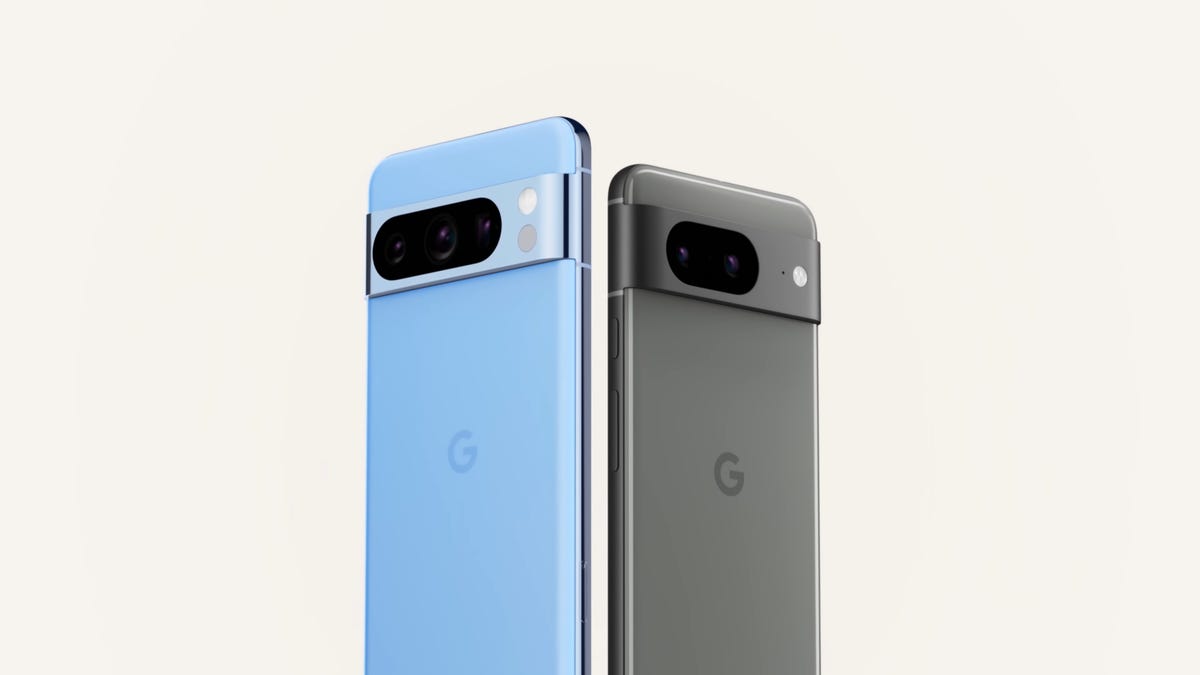There were a ton of unofficial leaks and rumors about the Pixel 8 and Pixel 8 Pro in the lead up to the Made by Google event. Now, they’re official: Google revealed its latest Android smartphones on Wednesday, sporting new AI features, a faster SoC, and upgraded cameras. But how well do these two new devices fare when you put them head-to-head? And which should you buy?
Display size and cameras
The Pixel 8 is the more affordable option, starting at $699, which means Google is cutting some corners here and there. That starts with the size of the screen: The regular Pixel 8 sports a 6.2-inch screen, similar in size to the standard iPhone 15 Pro. The Pixel 8 Pro, which starts at $999, is 6.7 inches.
This difference in display size also means a difference in resolution. The regular Pixel 8 packs a 1080 x 2400 pixel display with a 20:9 ratio at 428 PPI. The Pixel 8 Pro, on the other hand, sports a higher resolution of 1344 x 2992, in a 20:9 ratio at 489 PPI. Both displays look great, but if you prefer a larger screen, the Pixel 8 Pro is going to be your best choice.
The cameras are another point of difference: While both devices sport the same 50MP main camera, the Pixel 8 only offers a 12MP ultrawide, whereas the Pixel 8 Pro sports a 48MP ultrawide with a 48MP telephoto lens too. Both devices sport a 10.5 MP Dual PD selfie camera on the front and take advantage of Google’s various photo AI functions, which will help you take better photographs with either device.
RAM, storage, and battery
The Pixel 8 comes in storage options of 128GB and 256GB, while the Pixel 8 Pro comes in 512GB and 1TB. The Pixel 8 offers more than 24 hours of charge thanks to a 4,575 mAh battery, and Google claims similar battery life on the larger Pixel 8 Pro, which comes with a 5,050 mAh battery. No matter which one you go with, you’ll have solid storage options and decent battery life, especially coupled with Android 14’s new battery improvements.
The RAM on the Pixel 8 caps out at 8GB. The Pixel 8 Pro, meanwhile, will offer 12GB of RAM. While 8GB is more than enough for daily applications and messaging, those who plan to use their phone for gaming and other more intense uses will probably want to go for the 12GB of RAM offered with the Pixel 8 Pro.
What’s the same
Some things that aren’t all that different between the Pixels. For instance, both devices sport the newest Google-made chip, the Google Tensor G3. Both devices run Android 14 out of the box, and will receive a whopping seven years of guaranteed software support.
Additionally, both the Pixel 8 and Pixel 8 Pro ship with new AI features, including “Audio Magic Eraser,” which lets you reduce distracting sounds in videos, and “Best Take,” which superimposes the best faces from a series of group photos into one final product. Both of these devices are also IP68-rated for water and dust resistance, and feature Google’s Titan M2 security chip, which supports face unlock and in-display fingerprint unlock.
Which Pixel 8 should you get?
It all depends on what you’re looking for. Those who plan to use their new phone for more intense tasks, or just want the biggest and baddest camera options, will find the Pixel 8 Pro the best fit. But, if you just want to see what Google’s new Pixel phone has to offer, the regular and cheaper Pixel 8 has more than enough to offer for the price, especially with the power of Google Tensor G3 powering both devices.
You can pre-order both the Pixel 8 and Pixel 8 Pro right now, and they’ll be available starting Oct. 12. The Pixel 8 comes in Hazel, Obsidian, and Rose, while the Pixel 8 Pro comes in Bay, Obsidian, Porcelain.

